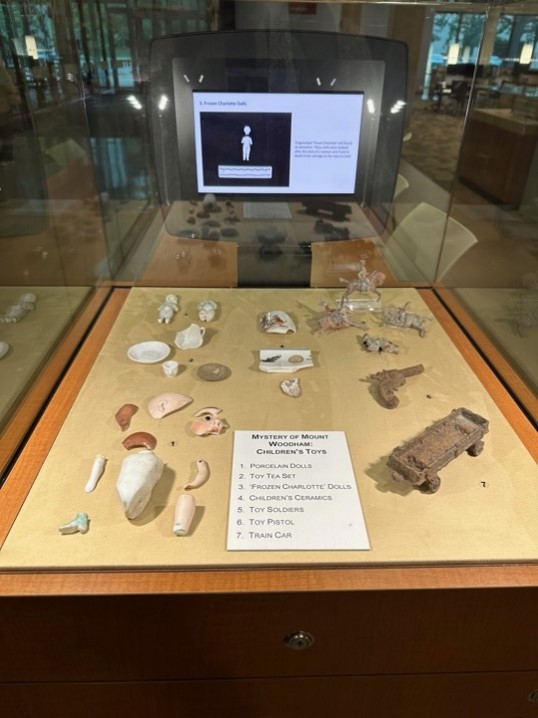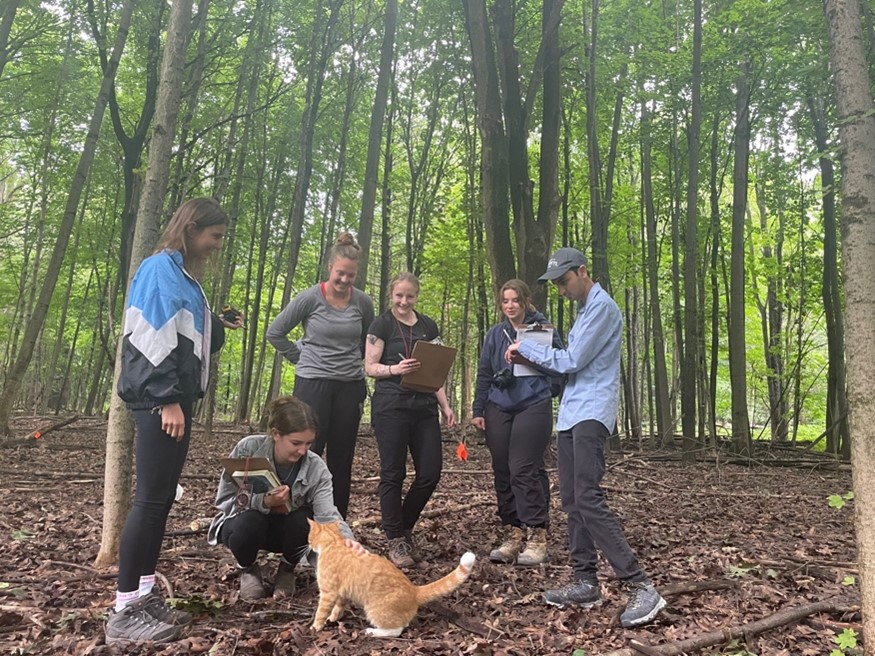
Mitchell Ma, PhD Candidate, University of Toronto and Susannah Clinker, PhD Student, University of Toronto
The Schreiber Wood Project (SWP) field school, led by Professor Michael Brand with assistance from Dr. Trevor Orchard takes place on lands once owned by the Schreiber family, settlers from England who acquired the land in the mid-19th century. This land later became the northern end of the University of Toronto Mississauga (UTM) campus in the Greater Toronto Area. The SWP field school offers UTM students the opportunity to be trained in archaeological excavation within their campus grounds.

Picture 1: Outreach Display case showcasing artifacts recovered from the SWP field school at the University of Toronto Mississauga Library (Photo Credit: Mitchell Ma)
As Teaching Assistants (TAs) in the SWP field school during the summer of 2023, we supported Dr. Brand and Dr. Orchard, not only helping teach the field students but also learning valuable lessons ourselves. Teaching prompted us to reassess our skills and rediscover the motivations that led us to pursue archaeology originally. As the students delved into excavations, uncovering the historical roots of the campus, we witnessed a passion for archaeology igniting within many of them. Watching these moments in the field school was eye-opening and convinced us that teaching isn’t just about sharing knowledge; it’s also about keeping our own love for learning alive.
Looking back at our memorable field season, two significant takeaways emerged:
- A teacher needs to be willing (and eager) to be taught.
As teaching assistants, our primary task was to help instruct the field school students. However, each day became a learning experience, not only from Dr. Brand and Dr. Orchard but unexpectedly from our students too. A notable instance occurred when we recognized our lack of compass skills, and, to our surprise, our students adeptly stepped into the role of instructors. This exchange of knowledge became a testament to the reciprocal nature of learning in the field school environment.
2. Having fun is an important catalyst for learning.
Whether it be because of weather or strenuous excavations, some field days are challenging. What gets any archaeologist though these days are smiles and camaraderie with friends and colleagues. The students’ good humour became a source of inspiration, turning challenging days into amazing ones. One memorable moment involved a timely visit from a local outdoor cat during a forest survey. While the cat playfully distracted the students from their work, the joy it brought infused everyone with energy, ensuring we finished the afternoon survey on a strong note.

Picture 2: A group of SWP field school students enjoy a well-deserved break to pat a local cat fascinated with their survey work in the UTM forest (Photo Credit: Susannah Clinker)
Since 2013, the field school has evolved with Dr. Brand and Dr. Orchard at its core. While teaching assistants like us come and go, the collective experience of past teaching assistants echoes through time in field notes, excavation guides, and organizational systems. Each graduate student brings their own specialized research focus to the table, enriching the legacy of the SWP. Many of these former teaching assistants and students return, contributing to the ongoing success of the field school. As we continue this tradition, fostering a connection with the field school, we eagerly anticipate the ongoing journey of learning and growth it offers. Together, we look forward to maintaining a connection with the field school and continuing to learn from it.

Leave a Reply
You must be logged in to post a comment.